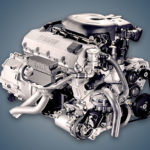M40B18 is the first inline 4-cylinder engine of the M40 family, the older brother of the M40B16, developed in 1987 as a replacement for the outdated M10 series. The engine is based on a cast-iron cylinder block covered with an 8-valve head with one camshaft and hydraulic lifters (valve adjustment is not required on the M40).
The diameter of the intake valves is 42 mm, exhaust 36 mm. Characteristics of BMW M40 camshafts: phase 244/244 rise 10.6/10.6 mm.
The timing drive uses an unreliable belt that requires constant monitoring and replacement along with the roller, on average, once every 40 thousand km. With a frivolous attitude to this problem, the risk of breaking the timing belt and bending the valves increases.
This motor was used on BMW cars with the 18i index.
In parallel with the M40B18, since 1989 a more powerful 16-valve M42B18 has been produced for sports 18i.
Specifications
| Production years | 1987-1994 Steyr Plant |
| Displacement, cc | 1795 |
| Fuel system | injector |
| Power output, hp | 113 /5500 rpm |
| Torque output, Nm | 162 /4250 rpm |
| Cylinder block | cast iron R4 |
| Block head | aluminum 8v |
| Cylinder bore, mm | 84 |
| Piston stroke, mm | 81 |
| Compression ratio | 8.8 |
| Features | no |
| Hydraulic lifters | yes |
| Timing drive | belt |
| Phase regulator | no |
| Turbocharging | no |
| Recommended engine oil | 5W-30 |
| Engine oil capacity, liter | 4.0 |
| Fuel type | petrol |
| Euro standards | EURO 1 |
| Fuel consumption, L/100 km — city — highway — combined |
10.3 6.7 8.6 |
| Engine lifespan, km | ~300 000 |
| Weight, kg | ~132 |
Disadvantages of the M40B18 engine
The characteristic problems of BMW M40B18 engines are: knocking, floating rpm, dips when gaining speed and overheating. Each problem has its own reasons.

- Engine knocking can be caused by wear on the camshaft, hydraulic lifters and rocker arms. The condition of the parts must be checked.
- Floating rpm arise due to a breakdown of the mass air flow sensor, there may be an air leak. Carefully inspect the engine, check the mass air flow sensor, assess the condition of the idle valve and the throttle valve, check the lambda probe. Poor camshaft rotation may be causing the problem.
- If jolts are noticeable when picking up speed, most often you need to clean the injectors.
- If the engine overheats, there may be several reasons: it is necessary to inspect the pump, thermostat. The reasons may lie in the radiator, pipes of the cooling system.
- If there are problems with the fuel pump, damaged wires, coil and spark plugs, the engine will not start. The timing belt can cause trouble.






